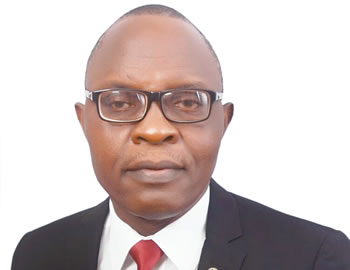Surveyor Akinloye Olufemi Oyegbola is the incumbent National President of the Nigerian Institution of Surveyors. In this interview with MODUPE GEORGE, he spoke on his vision for the institution, challenges of the profession and other issues in surveying.
What are your visions and plans for the institution?
One particular thing that has always stuck my mind is the peculiar nature of the profession. The profession is such that doesn’t advertise itself. People don’t know about it and that is why I feel one really needs to concentrate on areas such as advocacy, enlightenment, awareness and publicity for the institution, so that what couldn’t be obvious would be.
And to really ensure this, I have decided to come up with an award for all the branches, where they would present what they have done. Right now, I am on a walking visit to the branches, where I have been telling them what they have to do to qualify for the award. I believe that if at every nooks and crannies, where we have those branches in the country, they try to put whatever they do in the public domain, we would have gone a long way on the publicity aspect.
Also, the event of recent past seems to have shown us that we really need to come to terms with the laws that established our regulatory body. We have had some misunderstandings that were not well managed in the past which had even had us going to the press and court over the interpretation of the law and the rest of it. I am looking beyond the resolution of the issue itself. I believe that since it has to do with the law, one expects that it is the court that would be the arbiter and we are on that.
Also, I believe that one thing that could actually be done to stem such re-occurrence is to come up with something that could be like our bye-laws which would be more specific about issues on the relationships of our different departments, the body itself and the rest of it.
I would also like to facilitate more patronage from the government. I’m looking at how I can create more enabling environment with those in government. When there is peace and mutual understanding, I believe whatever you want to further would move faster than what it used to be. So, I want to establish that peaceful coexistence.
Why did you say that corruption is responsible for cases of building collapse in the country?
Corruption is a vice and it is wide when it comes to defining it. Whenever you are supposed to do what is right and you do the opposite, somewhere down the line there is corruption. So, if a building is supposed to stand and it’s not, there is corruption somewhere and we can now start to pin-point where and how. If we are to start from the materials, we would say that the actual quality materials that were supposed to be used were not used.
When the right materials are not used to build, obviously that is corruption. Now, coming to the design itself, if you have a design problem, then it is corruption. If the design is done by someone who is not supposed to do it, it is corruption. Also, when something is wrong with the supervision, which most time is part of what is responsible for the collapse, then it is corruption. The professionals in government are supposed to supervise, they either would not go for supervision or when they do, they pretend not to see for reasons that we all know even up to the extent of allowing people to put structures where they ought not to be at all. So, you can go on and on.
How do you intend to prosecute the corrupt elements in your institution?
Basically all professional bodies have that aspect of the practice that deals with the ethics of the profession and even have the regulatory bodies that take care of that. We have our own regulatory body called the Surveyors Councils of Nigeria (SURCON). Now, while an erring surveyor could be punished as per the constitution of NIS to which he has subscribed, he is still liable again under the law to be punished by the SURCON. So, there is no respite anywhere. Its just that clients don’t complain, they don’t lodge their complaints where they are supposed to. People are used to the just rub it on the surface thing and just letting it go.
To what extent is the government involved in NIS activities?
The rapport has not been too encouraging, which was part of what I am set out to change. However, things are changing for the better. For instance, there was a council set up on lands in Ilorin. The Surveyor General called me and told me everything about it and before they presented what they had in the council, I already had a copy of it and we had gone through it at NIS. This wasn’t happening before. Now we are talking together.
What effort will you make to ensure a highest standard of professional conduct and ethics in the profession?
Quackery is in most of the professions and I always say to my colleagues “quackery is not the issue. You sustained it, so, you don’t complain about the quacks.” However, what I do is to encourage surveyors to report themselves. If that is done, there would be a sense of remorse. More so, for the clients who use our services, at every opportunity I let them know that they can either report to NIS branch around them or the council itself.
Either of them would take it up. I am trying to create an enabling environment among all the departments and the stakeholders, so that we can easily work together to get the desired result within the shortest possible time.
What role are the women-in surveying going to play in your new agenda?
Women-in-surveying are doing well and they could do more. They organise regional seminars, and I always advise them to involve the press in their activities. They go to secondary schools, especially girls’ secondary schools to create awareness. They are to attract girls into the profession. So that they can be informed about the profession and that women too could thrive in it.
WATCH TOP VIDEOS FROM NIGERIAN TRIBUNE TV
- Relationship Hangout: Public vs Private Proposals – Which Truly Wins in Love?
- “No” Is a Complete Sentence: Why You Should Stop Feeling Guilty
- Relationship Hangout: Friendship Talk 2025 – How to Be a Good Friend & Big Questions on Friendship
- Police Overpower Armed Robbers in Ibadan After Fierce Struggle





